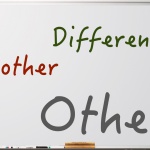Many learners of English confuse the words another, other and different. They often use another instead of different, and other instead of another. In this post, I'm going to clarify the differences for you.
How to use ‘each’ and ‘every’
Each and every are very confusing words for some learners. They are both used with singular nouns when we are talking about two or more things. However, there are some important differences, which I'm going to help you understand in this post.
The difference between ‘a/an’ and ‘one’
The words a/an and one are confusing for many learners of English, especially for learners who do not have articles in their native language. This confusion often causes unnatural sentences like 'I would like one coffee, please.' In this post I'm going to give you a simple explanation to help you understand the difference and use these words correctly.
How to use ‘concentrated’ and ‘focussed’
The words concentrate and focus have almost the same meaning in English. However, contrary to what many learners think, they are not the same in the passive form. In this post, I will explain the difference.
What is the difference between ‘this’ and ‘that’?
The words this and that can sometimes be confusing for English learners. In this post, I'm going to explain a few of the differences between these two words and give some examples of their use.
How to use ‘travel’ and ‘trip’
Take a look at this sentence:
*I had a very good travel.*
This statement contains a very common mistake, even among more advanced learners. In natural English, we cannot use the noun 'travel' in this way. The word 'travel' is uncountable and it has a general meaning.





